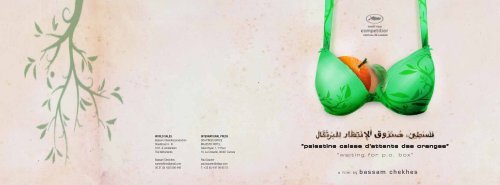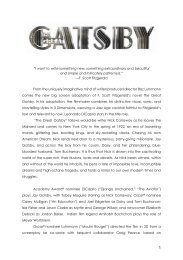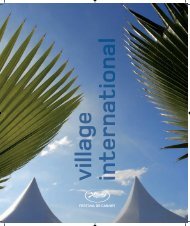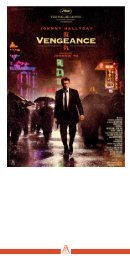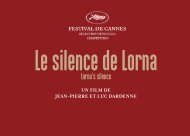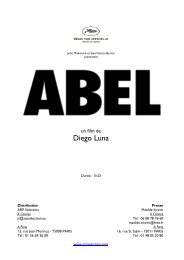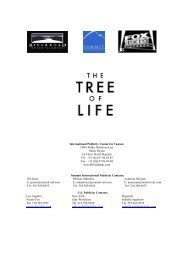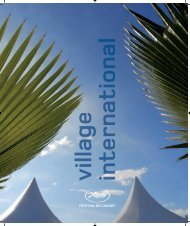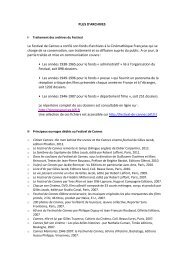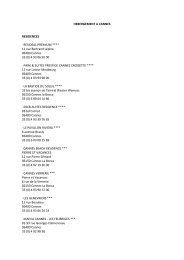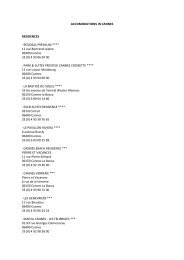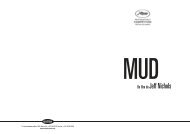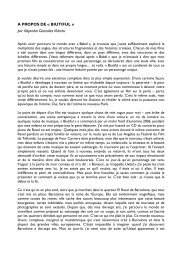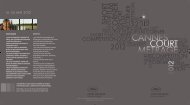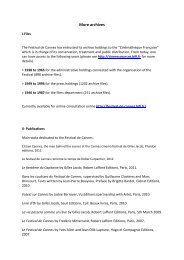a film by bassam chekhes - Cannes International Film Festival
a film by bassam chekhes - Cannes International Film Festival
a film by bassam chekhes - Cannes International Film Festival
You also want an ePaper? Increase the reach of your titles
YUMPU automatically turns print PDFs into web optimized ePapers that Google loves.
WORLD SALES<br />
Bassam Checkhes production<br />
Staalstraat 4 - III<br />
1011 JL Amsterdam<br />
The Netherlands<br />
Bassam Checkhes<br />
sammy<strong>film</strong>s@gmail.com<br />
00 31 (0) 655 506 446<br />
INTERNATIONAL PRESS<br />
DDA PRESS OFFICE<br />
MAJESTIC HOTEL,<br />
Salon Royan 1, 1 st Floor<br />
10, La Croisette, 06407 <strong>Cannes</strong><br />
Paul Saunter<br />
paul.saunter@ddapr.com<br />
T: +33 (0) 4 97 06 85 15<br />
“palestine caisse d’attente des oranges”<br />
“waiting for p.o. box”<br />
a <strong>film</strong> <strong>by</strong> <strong>bassam</strong> <strong>chekhes</strong>
“palestine caisse d’attente des oranges”<br />
“waiting for p.o. box”<br />
a <strong>film</strong> <strong>by</strong> <strong>bassam</strong> <strong>chekhes</strong><br />
Official screening: Saturday 26 th of May, 11 am, Debussy Theatre<br />
Re-screening: Saturday 26 th of may, 3 pm, the Bunuel Theatre<br />
2 3
SynopSiS<br />
Deux jeunes cinéastes, Mustafa et Ayoub, sont<br />
sur le point de réaliser leur nouveau <strong>film</strong>; mais<br />
doivent arranger leurs idées et ajuster leur budget<br />
afin de s’adapter à la réglementation des différents<br />
donneurs de fonds. A la veille de leur réunion avec<br />
les financeurs potentiels, ils ont dormi et rêvé.<br />
Mustafa rêve de passer un examen chez les forces<br />
aériennes. Bien qu’il soit vêtu d’un uniforme de pilote,<br />
il porte au pied droit: une botte d’armée, et au pied<br />
gauche: un chausson. Ayoub, quant à lui est habillé<br />
pareil, mais a changé ses chaussures à l’opposé de<br />
Mustafa.L’apparence de Mustafa, laisse entendre<br />
l’audience éclater de rire, voyant que Ayoub décide<br />
de partir, Mustafa essaye de l’attraper mais y échoue<br />
à plusieurs reprises, vu que Ayoub accelérait vers sa<br />
voiture verte.<br />
Mustafa finit par le trouver au parking d’un super<br />
marché, entrain de séparer des oranges en les<br />
mettant dans différents cartons à envoyer dans<br />
différents pays du le monde.Ayoub a rêvé qu’il était<br />
à la réunion avec les financeurs, mais qu’il voulait<br />
appeler sa mère afin de lui poser une question. A la<br />
recherche d’un meilleur signal, il parcourt différents<br />
endroits tenant son téléphone portable et finit par la<br />
joindre au sommet d’une montagne. Il retourne plus<br />
tard à la réunion, et avec Mustafa; ils réécrivent leurs<br />
motivations derrière la réalisation de leur <strong>film</strong>.<br />
“WAITING FOR A P.O BOX” est l’histoire d’une<br />
orange qui pousse sans un arbre.<br />
SynopSiS<br />
Two young <strong>film</strong>makers, Mustafa and Ayoub, are<br />
about to make their new <strong>film</strong>, but they have to<br />
adjust their ideas and budget to fit the regulations of<br />
different funds. On the night before their meeting with<br />
potential funders, they slept and dreamt.<br />
Mustafa dreams he will take an exam at an Air Force<br />
Academy, though dressed in a pilot’s uniform, on<br />
his right foot he wears an army boot but on his left<br />
he is still wearing his flip-flop. Ayoub is dressed in<br />
the same outfit but has switched his footwear to the<br />
opposite of Mustafa’s.<br />
Mustafa’s appearance makes the hearing committee<br />
burst out in laughter, seeing that Ayoub decides to<br />
leave.<br />
Mustafa tries to catch up with Ayoub but fails to a few<br />
times, as Ayoub speeds up in his green car. Mustafa<br />
finally finds him at the basement of a super market,<br />
separating oranges in different boxes to be sent to<br />
different countries all over the world.<br />
Ayoub dreams that he is at the fund’s meeting but he<br />
wants to call his mother to asks her a question.<br />
In search for a better signal, he roams around<br />
carrying his mobile phone to different places and<br />
finally reaches her on the top of a mountain. He later<br />
returns to the meeting and together with Mustafa they<br />
rewrite their motives behind making their <strong>film</strong>.<br />
“Waiting For P.O.BOX ” is the story of an orange that<br />
grew without a tree.<br />
4 5
L’aviS Du réaLiSateur<br />
“WAITING FOR P.O BOX” est un court métrage<br />
sur la reconnaissance, l’indépendance et<br />
l’originalité.<br />
Il relate des voyages personnels, retraçant les<br />
motifs des départs pour en comprendre les<br />
destinations dans un style cinématographique<br />
particulièrement créatif dans une région en<br />
pleine recomposition où le cinéma est amené à<br />
jouer un rôle communicationnel.<br />
Le <strong>film</strong> utilise les mécanismes de l’import et<br />
de l’export pour dépeindre les composantes<br />
majeures de tout échange.<br />
Les deux cinéastes, Mustafa et Ayoub, d’origine<br />
arabe, luttent pour réaliser leur <strong>film</strong>. Pour<br />
faire face à des problèmes de financement<br />
et de gestion, ils ont eu recours à des fonds<br />
étrangers. Aujourd’hui, un seul problème<br />
subsiste, celui de la traduction.<br />
“WAITING FOR P.O. BOX” est le résultat d’un<br />
exercice simple pratiqué aussi bien par les<br />
chanteurs que les cinéastes. Il s’agit de<br />
réarranger les mots pour leur donner une<br />
signification multiple. Il était drôle, pour moi,<br />
de constater qu’avec les mêmes mots, je<br />
pouvais aboutir à cinq nouveaux arrangements<br />
présentant chacun un point de vue différent.<br />
Cependant, la principale difficulté à laquelle j’ai<br />
du faire face est liée à ma situation personnelle.<br />
Citoyen syrien, j’ai vécu la moitié de ma vie en<br />
Syrie et l’autre aux Pays Bas et on attendait de<br />
moi en tant que cinéaste une prise de position<br />
sur certains sujets liés aux intérêts et à la<br />
politique internationaux.<br />
Director Statement<br />
“WAITING FOR P.O BOX” is a short <strong>film</strong> about<br />
recognition, independency and originality.<br />
It is an examination of personal journeys, tracing<br />
back the reason for their departure in order<br />
to forecast their destination, especially in a<br />
creative art like <strong>film</strong>s, which is asked to play a<br />
communicatory role in a region that is changing<br />
fast towards divisions.<br />
The <strong>film</strong> uses the mechanism of import and<br />
export to portray the basic components of any<br />
exchange.<br />
Mustafa and Ayoub, two Arab <strong>film</strong>makers<br />
struggling to make their <strong>film</strong> are hindered <strong>by</strong><br />
the local mismanaged funding entities, they<br />
are forced to resort to foreign funds. The only<br />
problem that remains is, meaningful translation.<br />
“WAITING FOR P.O BOX” was the outcome<br />
of a simple exercise, that most <strong>film</strong>makers<br />
and sometimes singers also do; which is<br />
the rearrangement of words to form multiple<br />
meanings. To me it was funny that I could use<br />
exactly the same words and make five new<br />
arrangements, where each has a meaning that<br />
could present a different point of view of the<br />
same issue.<br />
But the main sentence in itself came from<br />
a situation that I have been facing for some<br />
time. While I lived in Syria half of my life and<br />
the second half in the Netherlands, there was a<br />
certain expectation about certain subjects that<br />
I, as a <strong>film</strong>maker, should tackle because of their<br />
political international interest since I am Syrian.<br />
6 7
cinématographie<br />
Bien que le <strong>film</strong> utilise le dispositif et l’univers du rêve, je désirais,<br />
dès le départ, le tourner de la manière la plus proche et la plus<br />
fidèle possible à la réalité. J’ai travaillé sur la composition et le<br />
contraste entre ce que dit la scène et son lieu de déroulement<br />
afin d’insister sur le sentiment de rêve. Ainsi lors du tournage,<br />
j’ai délibérément choisi de ne pas masquer ou de ne pas modifier<br />
les détails liés aux lieux de tournage. Loin de les considérer<br />
comme des restrictions, je les ai intégrés afin qu’ils fassent partie<br />
intégrante de l’histoire. L’utilisation combinée des mouvements de<br />
caméra et des possibilités offertes par l’éclairage m’ont permis<br />
d’obtenir cet effet particulier de «vrai rêve ».<br />
cinematography<br />
Although the <strong>film</strong> uses the dream as a framing device, from the<br />
beginning I wanted to shoot it as close as possible to reality, but to<br />
work more on composition and contrast between what the scene<br />
is about and where it is taking place in order to get that “dreamy”<br />
feel about it.<br />
So while shooting the <strong>film</strong>, I didn’t alter or hide the existing details<br />
in the location or see them as restrictions, instead I integrated<br />
them to become part of the story. Together with the camera<br />
movement and lighting I was able to get that “real-dream” look.<br />
8 9
BaSSam chekheS<br />
Bassam Chekhes est né en Syrie et a déménagé aus Pays-Bas où il a étudié l’art audiovisuel<br />
et est diplômé de l’Académie Gerrit Rietveld à Amsterdam.<br />
Il a tourné, réalisé et produit une douzaine de courts métrages et a collaboré dans différents<br />
projets avec d’autres artistes et cinéastes.<br />
Entre 1995-2000, il a travaillé pour de nombreuses agences de production néerlandaises<br />
et internationales, des agences de publicité et des stations de télévision dans différents<br />
départements tel que l’éclairage, la caméra, le casting et la production.<br />
Il travaille actuellement comme conseiller créatif et a participé dans le programme amusant<br />
d’éducation long métrage (Feature <strong>Film</strong> Educational Programs fun ) par la Royal <strong>Film</strong><br />
Commission (Jordanie) et l’institut du <strong>film</strong> de Doha.<br />
BaSSam chekheS<br />
Bassam Chekhes was born in Syria and moved to the Netherlands where he studied audiovisual<br />
art and graduated from Gerrit Rietveld Academy in Amsterdam.<br />
He shot, directed and produced a dozen short <strong>film</strong>s and collaborated in several projects<br />
with other artists and <strong>film</strong>makers. Between 1995-2000 he worked for numerous Dutch and<br />
<strong>International</strong> production companies, advertising agencies and television stations in different<br />
roles such as the light and camera department, casting and production.<br />
Currently he works as a creative advisor and has participated in the Feature <strong>Film</strong> Educational<br />
Programs fund <strong>by</strong> the Royal <strong>Film</strong> Commission- Jordan (RFC) and the Doha <strong>Film</strong> Institute.<br />
sammy<strong>film</strong>s@gmail.com | 00 31 (0) 655 506 446<br />
10 11
mahmouD aL maSSaD<br />
Mahmoud Al Massad est un cinéaste Palestino-Jordanien qui a reçu le prix de la<br />
reconnaissance internationale en atteignant les auditoires régionaux et internationaux<br />
pour ses documentaires SHATTER HASSAN, RECYCLE et THIS IS MY PICTURE<br />
WHEN I WAS DEAD. L’association de l’enfant du monde arabe a qualifié AL MASSAD<br />
d’ambassadeur de la culture pour l’année. Son travail a été utilisé dans le programme<br />
des académies du cinéma partout en Europe. Les deux longs métrages RECYCLE et<br />
TIS IS MY PICTURE WHEN I WAS DEAD ont été encouragés et pris en charge par<br />
l’Institut du <strong>film</strong> de Sundance. RECYCLE a reçu le prix le prix de la meilleure image cinématographique au festival Sundance<br />
en 2008, il a été publié théâtralement dans plus de 130 festivals internationaux et a été projeté en salle dans plusieurs pays<br />
européens ainsi que lors du ITVS Independent Lens aux états Unis d’Amérique .La première de THIS IS MY PICTURE a eu lieu à<br />
IDFA en 2010 et a gagné le prix du meilleur documentaire au festival international du <strong>film</strong> de Dubai .Son dernier projet en date<br />
BLESSED BENEFIT a reçu le Prix Shasha Grant à Abu Dhabi <strong>Film</strong> commission parmi plus de 120 autres projets en compétition et<br />
a été sélectionné pour le festival de <strong>Cannes</strong> 2012 dans la catégorie L’ATELIER .<br />
Mahmoud Al Massad, A Palestinian / Jordanian <strong>film</strong>maker, that has received international acclaim for his documentaries<br />
SHATTER HASSAN, RECYCLE and THIS IS MY PICTURE WHEN I WAS DEAD, reaching international and regional audiences. The<br />
Arab World Child Association chose Al Massad to be the 2002 Arab Ambassador of Culture. His work was used in the curriculum<br />
of <strong>film</strong> academies all over Europe. Both feature <strong>film</strong>s RECYCLE and THIS IS MY PICTURE WHEN I WAS DEAD were supported<br />
<strong>by</strong> the Sundance <strong>Film</strong> Institute. RECYCLE was awarded the World Best Cinematography Award at Sundance in 2008, screened<br />
at over 130 international <strong>film</strong> festivals and was theatrically released in several European countries as well as screened on ITVS<br />
Independent Lens (USA). THIS IS MY PICTURE premiered at IDFA in 2010 and won the Best Documentary Award at Dubai<br />
<strong>International</strong> <strong>Film</strong> <strong>Festival</strong>. His latest project BLESSED BENEFIT received the Abu Dhabi <strong>Film</strong> Commission Shasha Grant among<br />
more than 120 projects, and has been selected for the <strong>Cannes</strong> <strong>Festival</strong>’s program L’ATELIER 2012.<br />
almassad2002@yahoo.com | 00 31 (0) 618165310<br />
ruLa naSSer<br />
Rula Nasser est une productrice jordanienne qui a plus de 6 ans d’expérience dans<br />
le milieu du cinéma en Jordanie.En 2010, Rula a aidé à monter le Programme<br />
Educationnel Long Métrage de la RFC, un programme conçu pour aider et encourager<br />
les nouveaux talents/cinéastes jordaniens, dans un cadre éducatif, à pouvoir réaliser<br />
leur premier long métrage à budget très réduit budget. Dans le cadre du programme,<br />
Rula a produit ‘TRANSIT CITIES’ réalisé par Mohammed Hushki, lauréat du Prix de la<br />
Critique <strong>International</strong>e (FIPRESCI) et le Prix Spécial du Jury au <strong>Festival</strong> <strong>International</strong><br />
du <strong>Film</strong> de Dubaï.Et en 2011, et après le succès de TRANSIT CITIES, Rula produit ‘THE LAST FRIDAY’, réalisé par Yahya Al<br />
Abdallah, qui a remporté trois prix au <strong>Festival</strong> du <strong>Film</strong> de Dubaï et a été sélectionné au Forum <strong>Festival</strong> <strong>International</strong> du <strong>Film</strong><br />
de Berlin en 2012. Plus tard cette année, le <strong>film</strong> a remporté le Prix Spécial du Jury au <strong>Festival</strong> du <strong>film</strong> de Fribourg en Suisse.<br />
Récemment, Rula créé ‘THE EMAGINARIUM’, une maison de production et de distrubition qui vise à aider les cinéastes à réaliser<br />
leur potentiel, développer leur compétences, leurs histoires et l’unique language cinématographique.<br />
Rula Nasser is a Jordanian producer who has more than 6 years of experience working in the <strong>film</strong>making scene of Jordan. In<br />
2010, Rula helped establishing the RFC Educational Feature <strong>Film</strong> program, a program designed for first time Jordanian <strong>film</strong>makers<br />
to help them produce their feature <strong>film</strong>s on a low budget scale and within an educational component. As part of the program,<br />
Rula produced Transit Cities, directed <strong>by</strong> Mohammad Hushki, winner of the <strong>International</strong> Critic Award (FIPRESCI) and the Special<br />
Jury Prize at Dubai <strong>International</strong> <strong>Film</strong> <strong>Festival</strong>. Following the success of Transit Cities, Rula produced The Last Friday in 2011,<br />
directed <strong>by</strong> Yahya Al Abdallah, which won three awards at Dubai <strong>Film</strong> <strong>Festival</strong> and was selected at the Berlin <strong>International</strong> <strong>Film</strong><br />
<strong>Festival</strong> Forum in 2012. Later that year, the <strong>film</strong> won the Special Jury Prize at the Fribourg <strong>Film</strong> <strong>Festival</strong> in Switzerland. Recently,<br />
Rula established The Imaginarium, an independent production and distribution house aimed at helping <strong>film</strong>makers realize their<br />
potentials and develop their skills, stories and unique cinematic language.<br />
rula.nasser@gmail.com | 00 962 (0) 79 5520056<br />
12 13
creW<br />
Bassam Chekhes Director<br />
Bassam Chekhes Producers<br />
Rula Nasser<br />
Mahmud Al Massad<br />
Lina Alabed Assistant Director<br />
Bassam Chekhes DOP<br />
Mais Ghammoh Focus Puller<br />
Amer Daboub<br />
Hamzeh Arnaout Boom sound<br />
Setareh Samavi Costume Dresser<br />
Bassam <strong>chekhes</strong> Editor<br />
Sarah Kaskas Sound editor<br />
Marcel de Hoogd Sound design<br />
Michel schöpping Sound mixing<br />
Barend Onneweer Colourist<br />
Ivo Mulder Graphic design<br />
caSt<br />
Rami Al Nihawi Ayoub<br />
Yazan Al Rousan Mustafa<br />
Nic Foster Air force Academy<br />
Supermarket Owner<br />
U Fund Manager<br />
Jane-ann Heffernan Air Force Academy<br />
U Fund Seretary<br />
Nour Abu Haltem Flute Player<br />
14 15


